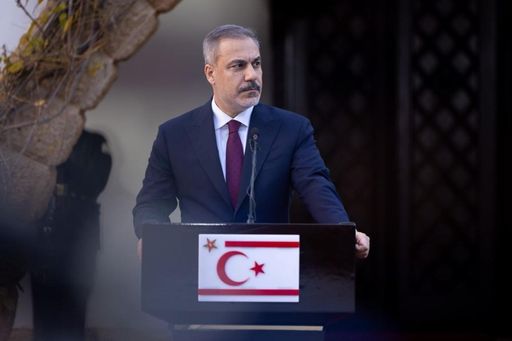Turkish Republic of Northern Cyprus (TRNC) President Ersin Tatar has said that formal negotiations on the Cyprus issue will not resume unless the sovereign equality and international status of Turkish Cypriots are recognised.
"We obviously, in the last four years, have consolidated our new policy that unless our sovereign equality and equal international status are reaffirmed, we will not resume formal negotiations for the resolution of the Cyprus problem," Tatar told reporters on Thursday at a news conference at UN headquarters in New York following an informal meeting on Cyprus.
"Because we believe very much that these assets, our sovereign equality and international status, are our inherent rights," he added.
Tatar noted that he came to the meeting "with a positive, constructive and forward-looking agenda" but expressed "profound disappointment" over incidents on the island following the previous informal meeting in Geneva in March.
"The actions of the Greek Cypriot leadership are causing Turkish Cypriot people to be anxious under pressure and increasingly threatened," he said.
Saying that "many Turkish Cypriots are in fear over being arrested or detained in the event they cross to South Cyprus or when traveling abroad," Tatar reaffirmed that "there are two states and two democracies, which reflect the will of the Turkish Cypriot people and the Greek Cypriot people, which have been in existence in Cyprus for the last six years."
"If there is to be a new and formal negotiation process, it must be based on the realities on the ground, treating the two sides equally, fairly and with dignity," he added.
Tatar also said they had aimed to announce the opening of four crossing points following the meeting, but this could not be realised, expressing deep regret over it.
"At the end of the day, the whole thing depended on the Greek Cypriots insisting that they will go through the buffer zone for military purposes and other territorial matters," he said, stressing that it is "something that the Turkish side could not possibly have accepted."
He further noted that UN Secretary General Antonio Guterres "did his best" to achieve progress on this issue, but due to the Greek Cypriots' stance, a solution could not be found to this "simple problem."
Responding to a question from Anadolu Agency on recent progress in mine clearance, Tatar said: "Our aim is to have a mine-free island all together."
He affirmed that the issue stems from the Greek Cypriot side wanting only certain areas to be cleared of mines while insisting that some areas remain untouched.
"For the time being, our policy is to make sure that we are free of all mines, you know, all over the place," he said.
The Turkish Cypriot leader further announced that he will meet again with the Greek Cypriot leader during the UN General Assembly in September and that the next broader-format informal meeting is planned to take place at the end of the year.

Decades-long Cyprus problem
Cyprus has been mired in a decades-long dispute between Greek Cypriots and Turkish Cypriots, despite a series of diplomatic efforts by the UN to achieve a comprehensive settlement.
Ethnic attacks starting in the early 1960s forced Turkish Cypriots to withdraw into enclaves for their safety.
In 1974, a Greek Cypriot coup aimed at Greece's annexation of the island led to Türkiye's military intervention as a guarantor power to protect Turkish Cypriots from persecution and violence.
As a result, the TRNC was founded in 1983.
It has seen an on-and-off peace process in recent years, including a failed 2017 initiative in Switzerland under the auspices of guarantor countries Türkiye, Greece and the UK.
The Greek Cypriot Administration entered the EU in 2004, the same year that Greek Cypriots single-handedly blocked a UN plan to end the longstanding dispute.



















